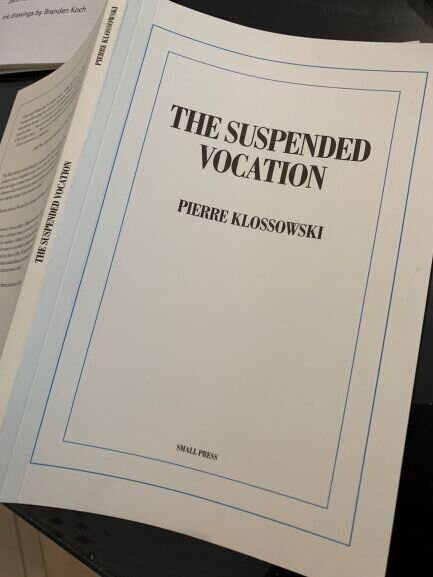One of the characters in Pierre Klossowski’s novella The Suspended Vocation (La Vocation suspendue, 1950), reflects disdainfully of another that his pleasure is “to roll God’s mysteries around in his mouth merely to savor their flavor!—whereas an uncorrupted intelligence knows how to content itself with contemplating and finding joy in them.” That’s a fine distinction, it seems to me, between savoring and contemplating, but to the extent that I grasp it, I think I have to count myself among the corrupted: savoring, honestly, feels like the way to go. But this belatedly translated first work of fiction by the remarkable French writer and artist—I prefer his large-scale drawings to the paintings of his younger brother Balthus—gave me less to savor than I’d hoped for. Tantalizingly, it’s framed as the incongruously long review (75 pages in this edition) of a novel, likewise titled The Suspended Vacation, by an anonymous author—this, a year before the French publication of the Ficciones of Jorge Luis Borges, who famously declared that, rather than writing the books he could imagine, his “procedure is to pretend that these books already exist, and then to offer a résumé, a commentary.” What Klossowski’s reviewer/narrator says of the novel-within-the-novella, that “although written in the third person, the book might well be taken as fictionalized autobiography, a confession of the author’s various religious experiences,” may also be in some way true of the novella-about-the-novel. It’s a tangled chronicle of a young seminarian’s attempts to pursue his religious vocation amidst incomprehensible ideological maneuverings among possibly chimerical factions within a fantastical version of the Catholic Church. It might be meant as a sort of satire on ecclesiastical hypocrisy such as one might expect from a writer who had intended to become a monk before abandoning the church for the study of Nietzsche and Sade; and like Klossowski, the protagonist—spoiler alert!—ends up in secular life, married. As Brian Evenson remarks in his Introduction, it’s like a spy story in which double agents turn out to be triple agents, only with priests and nuns—and, I’d add, with a lot less suspense. But it’s true, I kept thinking of James Jesus Angleton, the CIA counterintelligence director who eventually came to believe that almost everyone else in the agency was really working for the KGB. “Are we to surmise…that the author wants us to believe that the Church employs the same method as an intelligence agency?” asks our narrator, “Or that, perhaps, the latter is only one of numerous secularized replicas of the Holy Inquisition in the wider world?” But the novel of cold war espionage would always somehow, I think, reflect an awareness that the spies’ paranoid madness was being imposed to some degree on society at large, despite the opponents’ illusion that the world is merely the backdrop for their exploits; The Suspended Vocation betrays hardly any sense of a life outside its archipelago of monasteries and institutes. Whereas Klossowski’s later novels twist theological concepts into eroticized knots and use them to explore the nature and meaning of fictionality itself as an ever-more-encompassing universe, The Suspended Vocation seems claustrophobically trapped in a cloister of the mind. The device of the novel-within-the-novella, rather than allowing for a distanced and ironical perspective on the recounted events, simply adds further layers of uncertainty to a tale already rife with ambiguities. Who could trust so pompously judgmental a narrator as the one Klossowski has conjured here, the kind of writer who compares an episode in the imaginary novel he’s reviewing to ones in Cervantes and Schiller, only to remark, “Perhaps the author had some memory of these two models. What might he have accomplished if he’d also had just a little of their genius?” This stuffed shirt surely lacks the genius to judge genius. If only he’d had just a little of Klossowski’s.
❂
Pierre Klossowski, The Suspended Vocation, translated by Jeremy M. Davies and Anna Fitzgerald, with an Introduction by Brian Evenson, is published by Small Press, no place of publication listed, 2020.
❂
BARRY SCHWABSKY is art critic for The Nation and co-editor of international reviews for Artforum. Along with many books on contemporary art, he’s published three books and several chapbooks of poetry as well as a collection of mainly literary criticism, Heretics of Language (Black Square Editions, 2017). His new book of poetry, A Feeling of And, will be published next year by Black Square.
